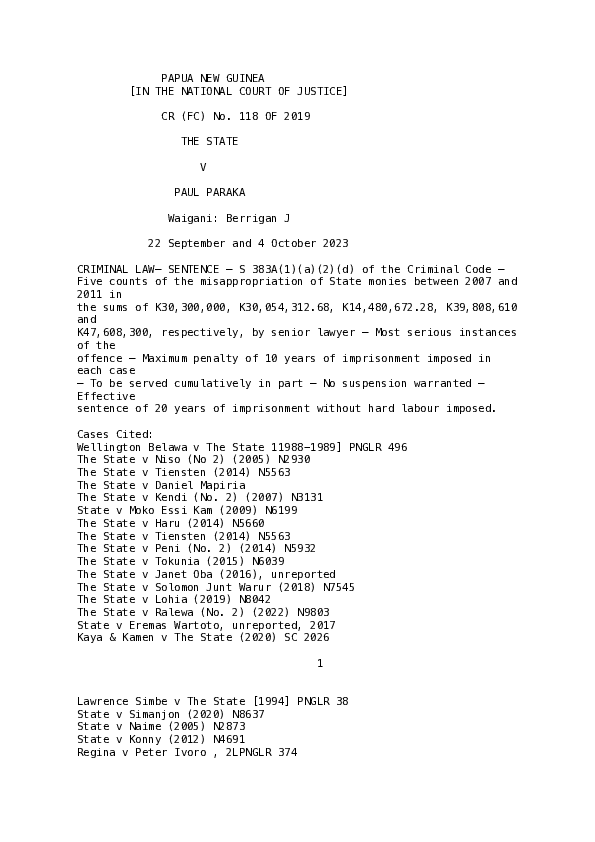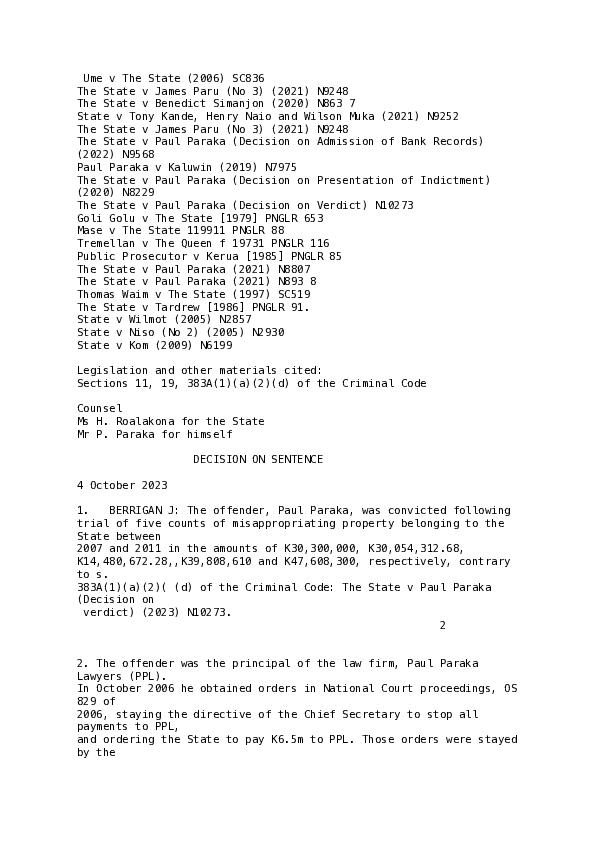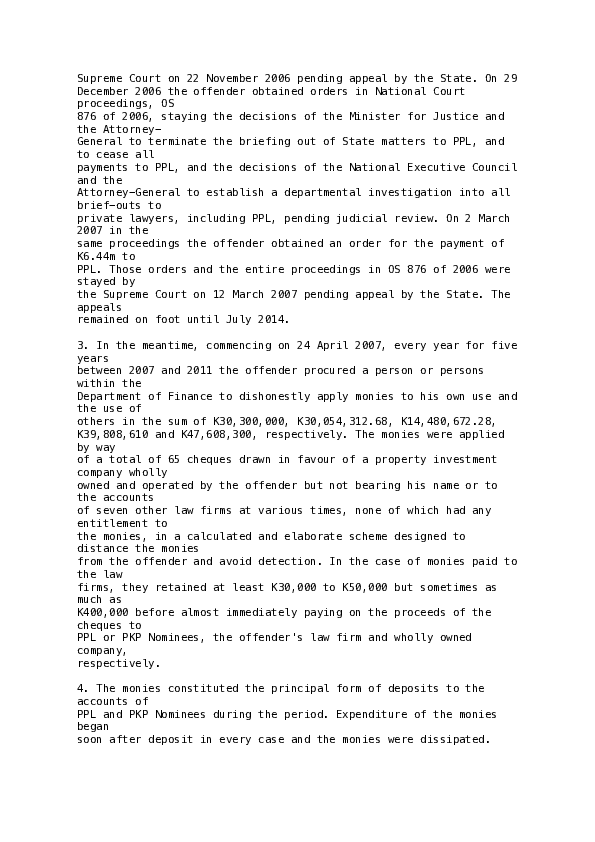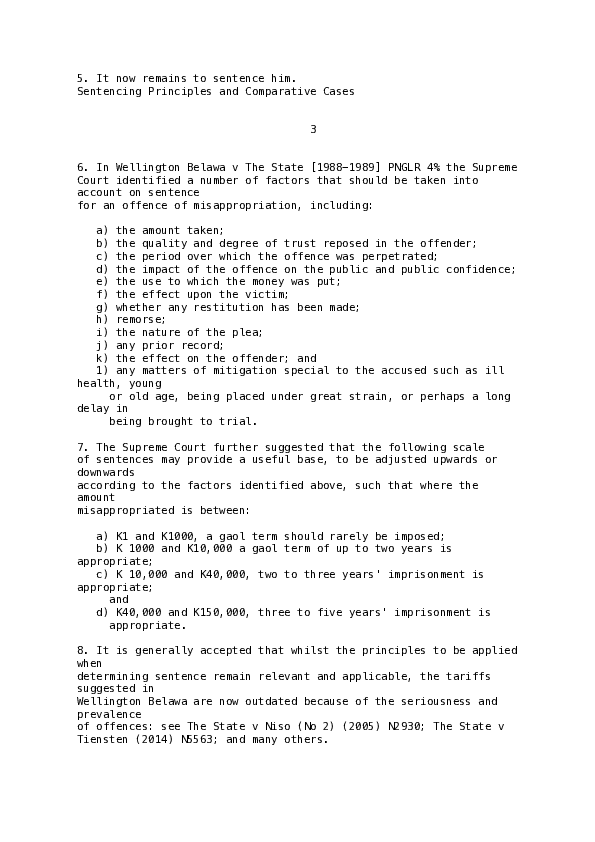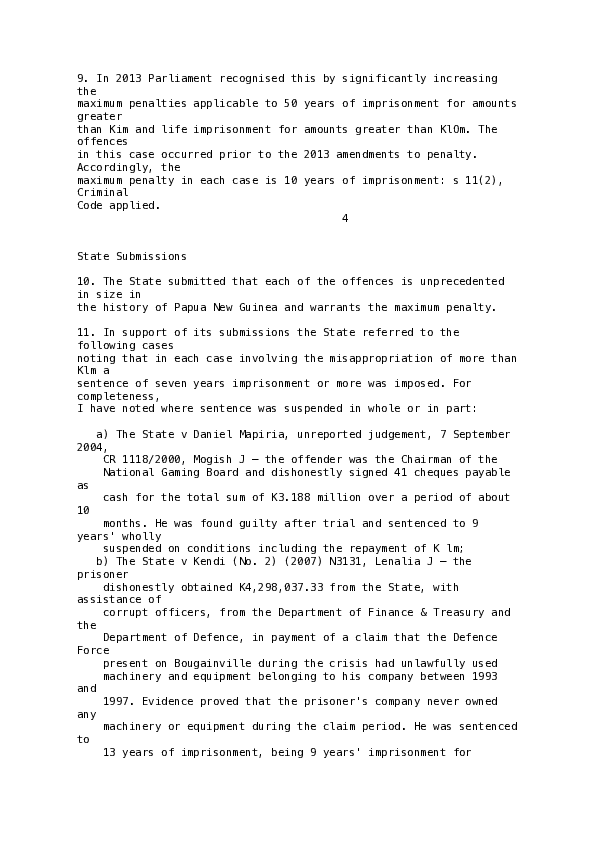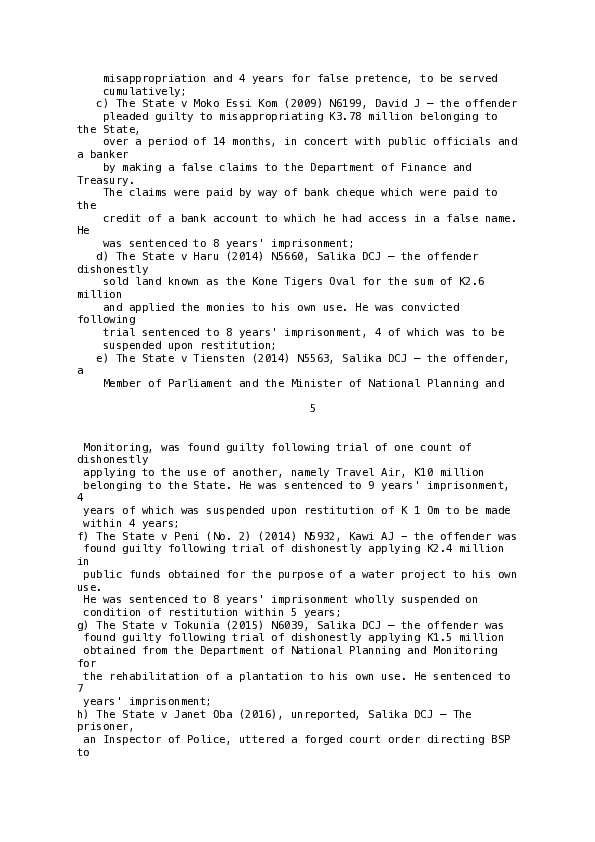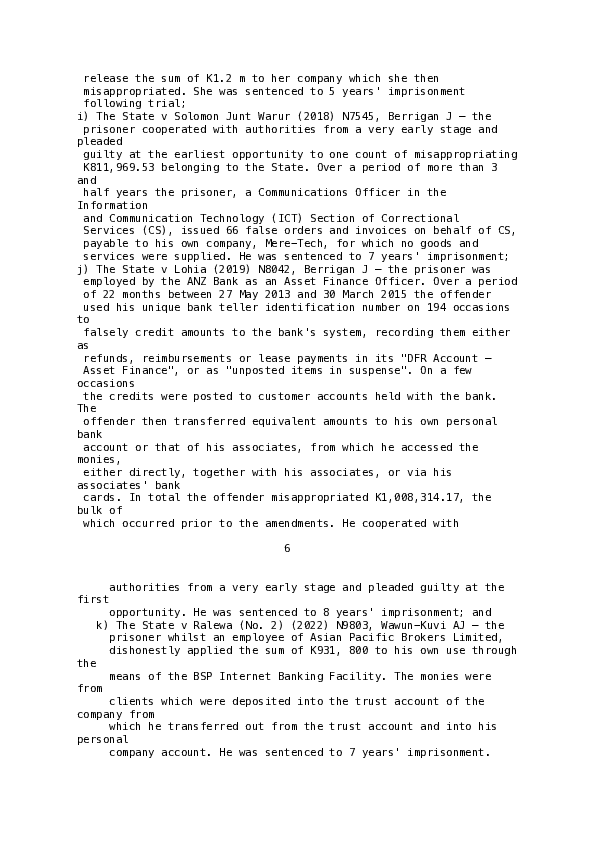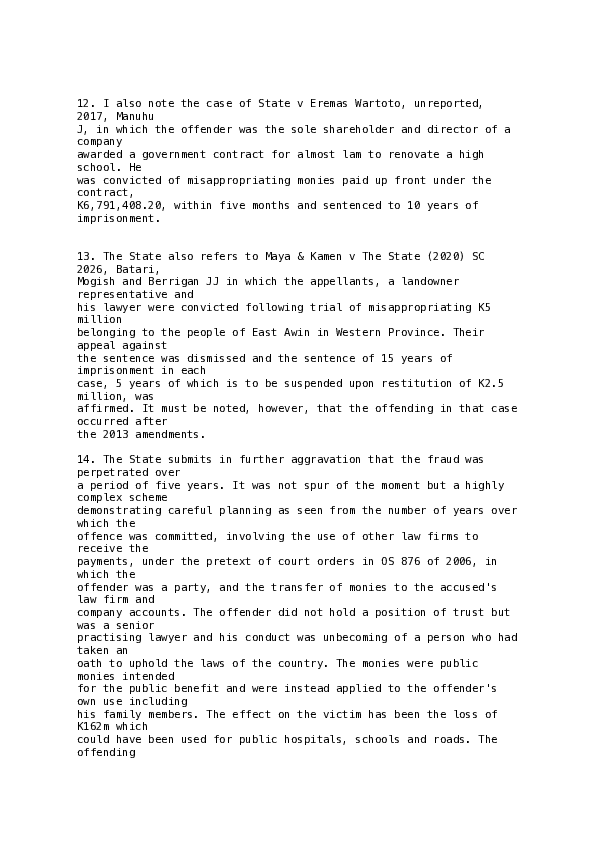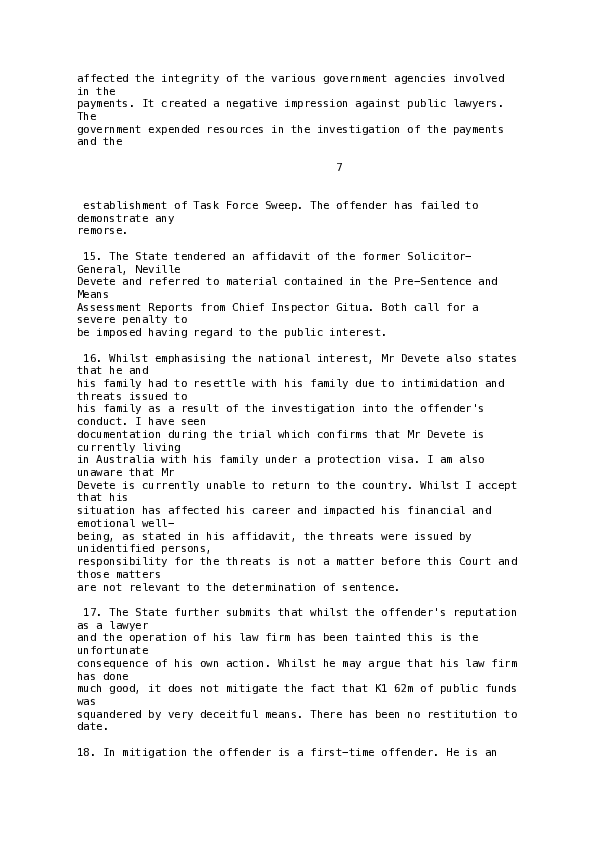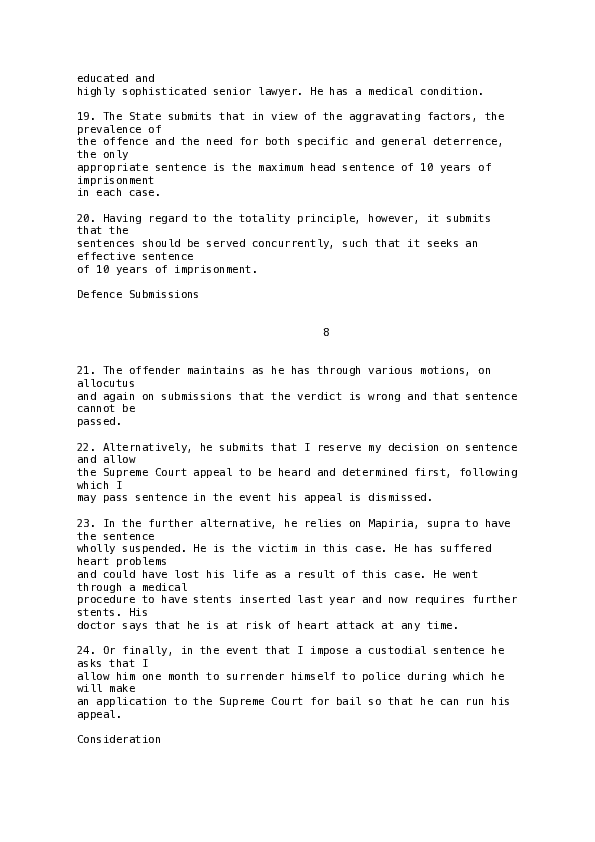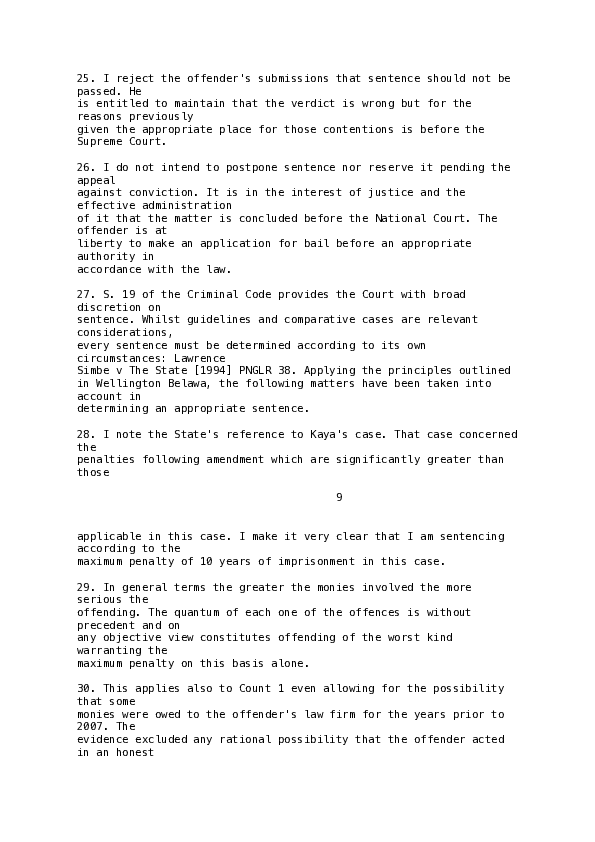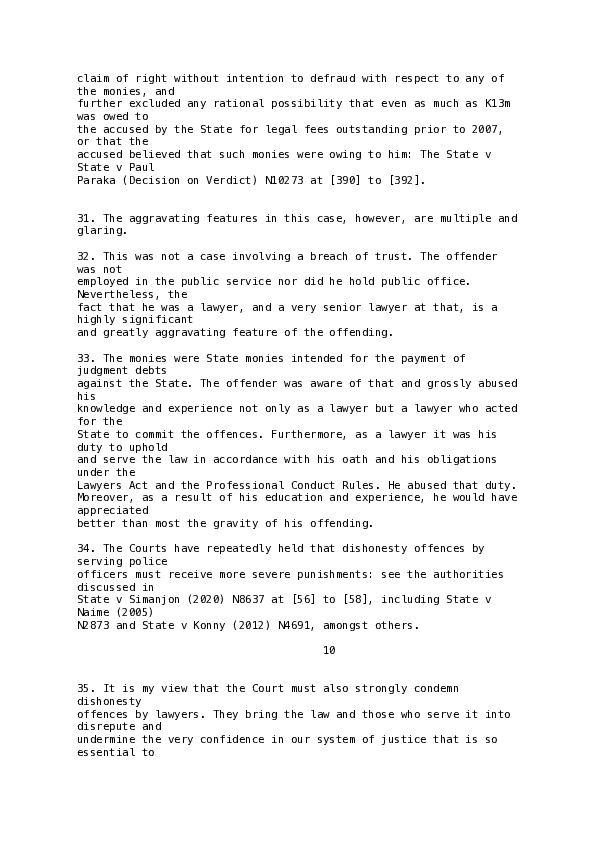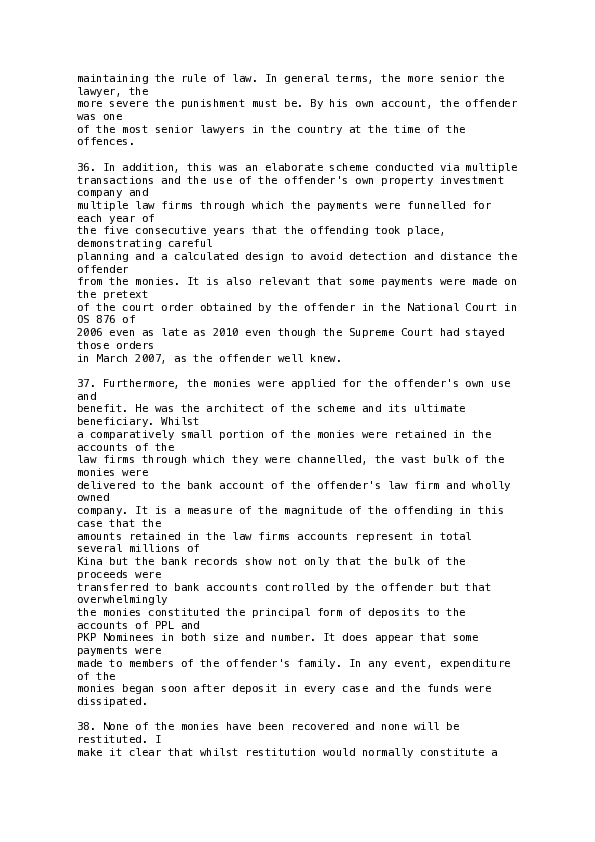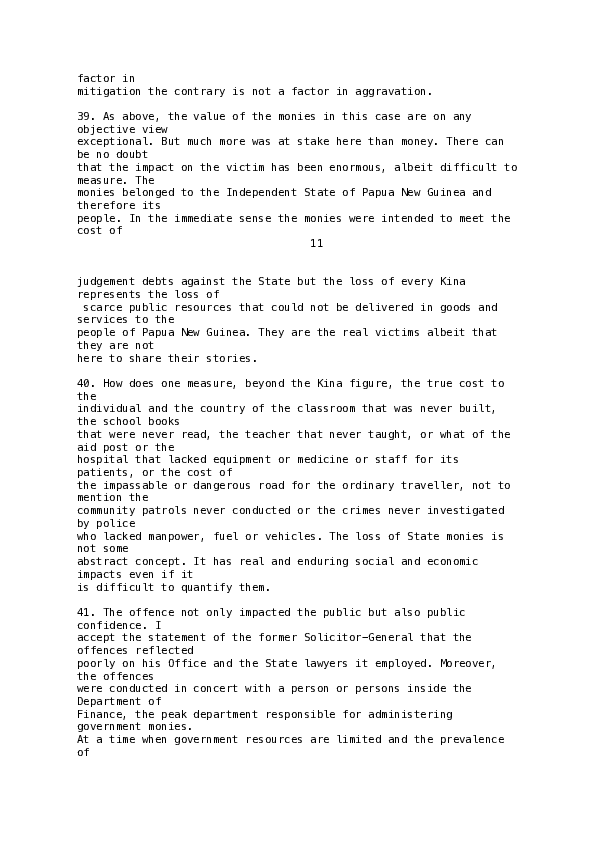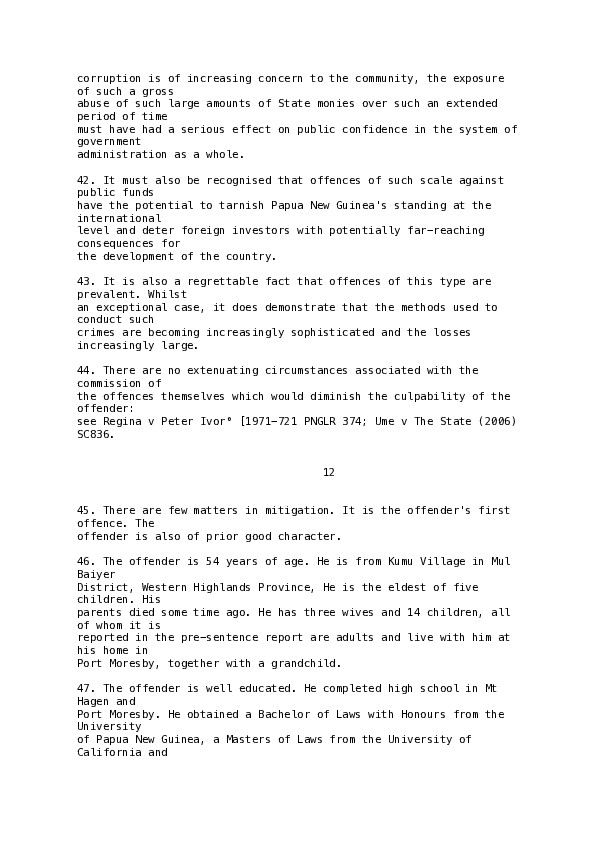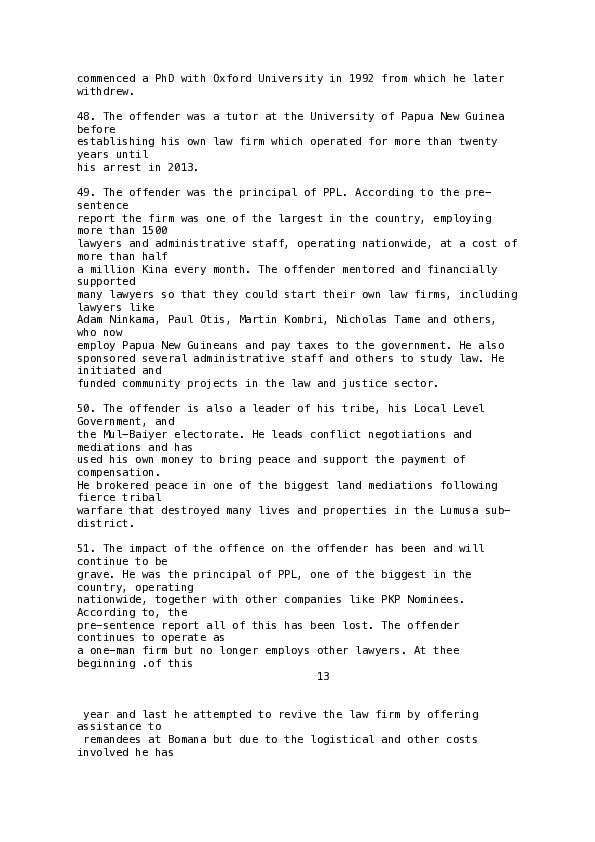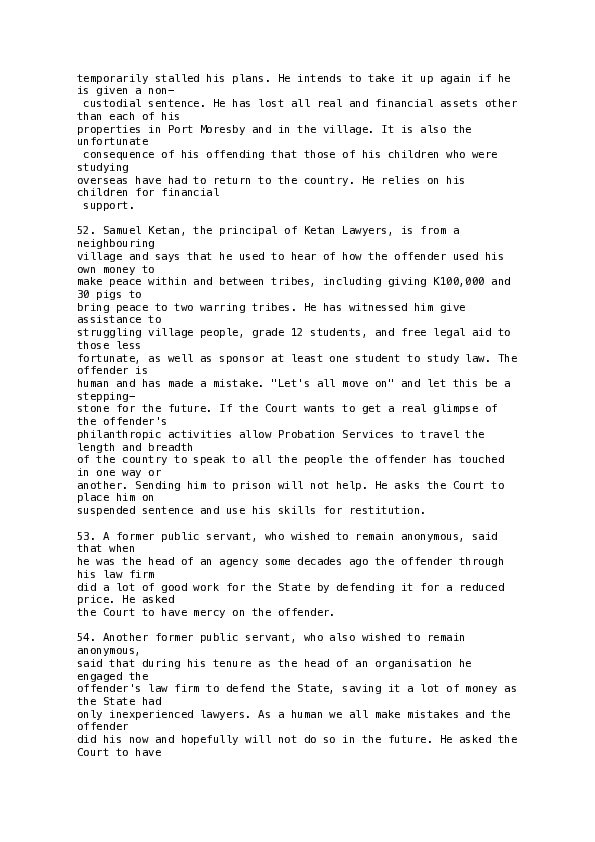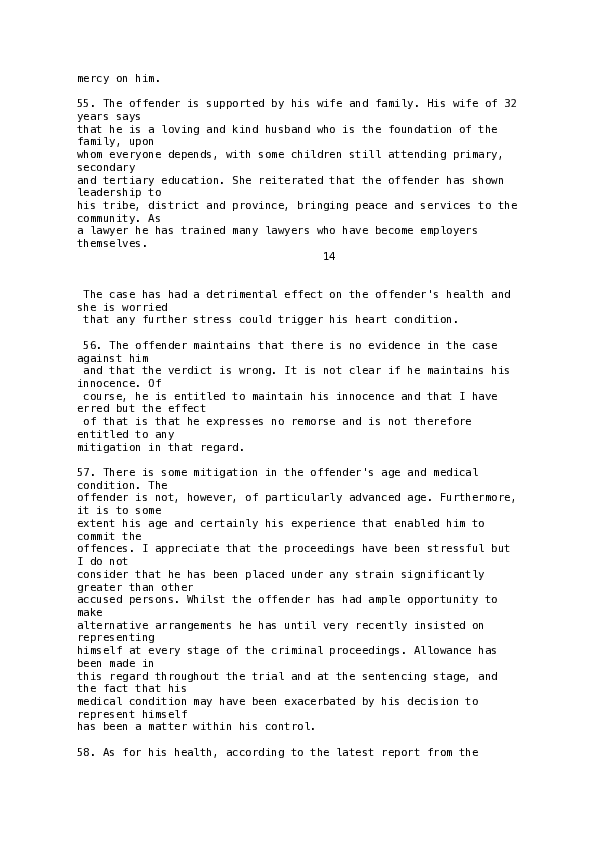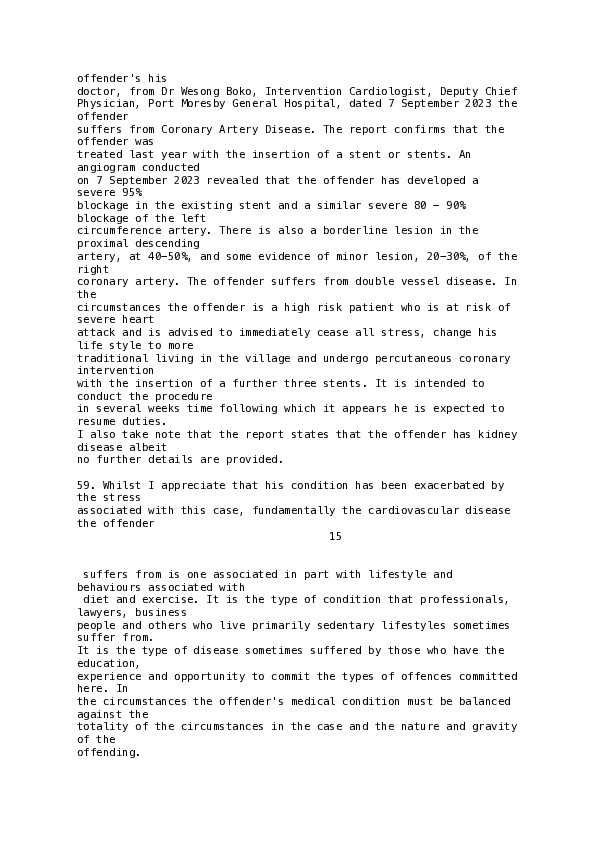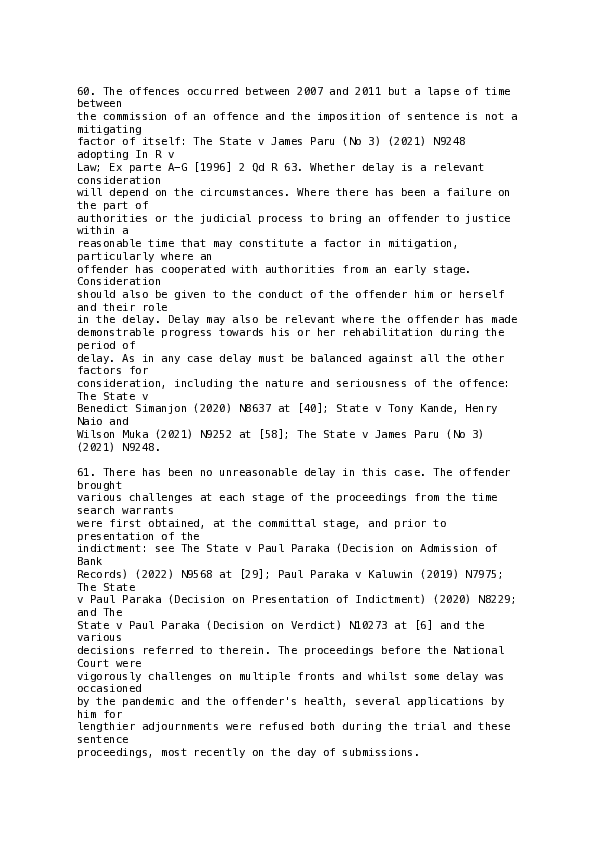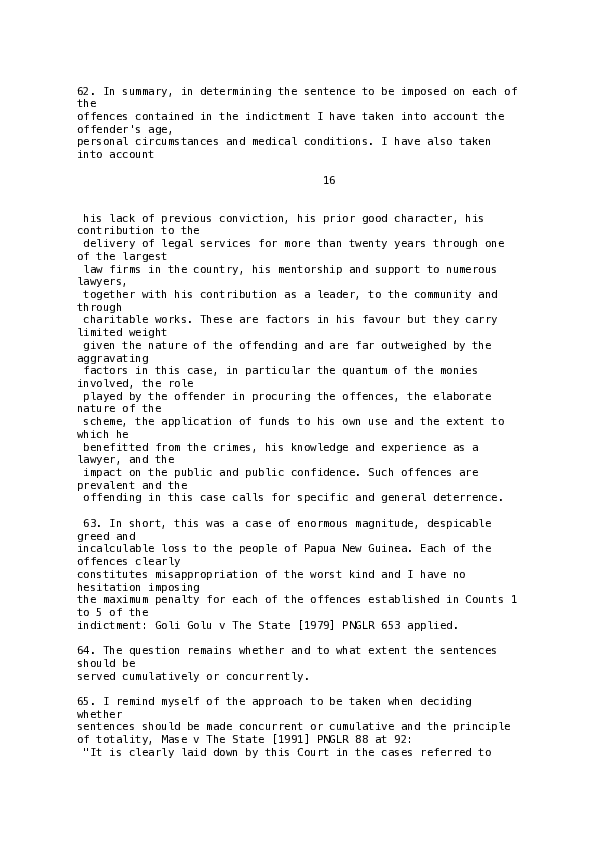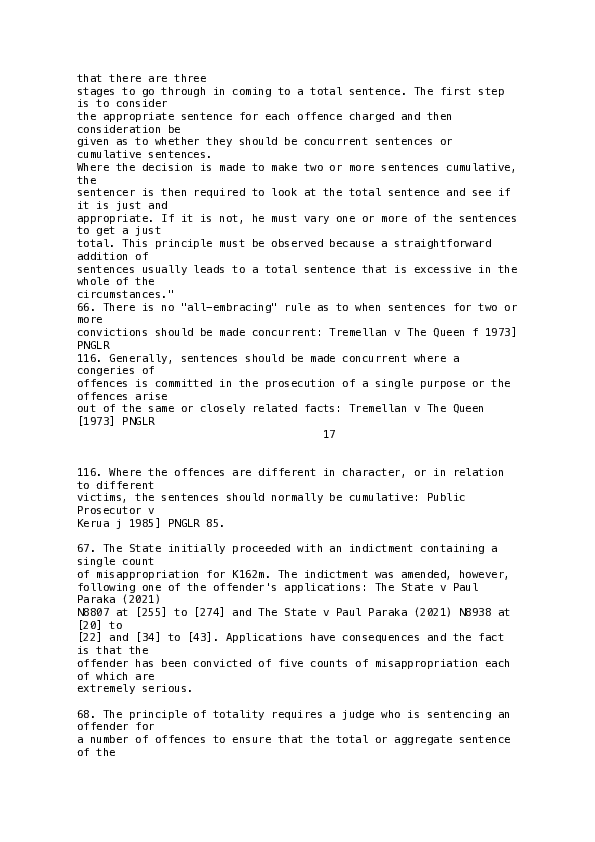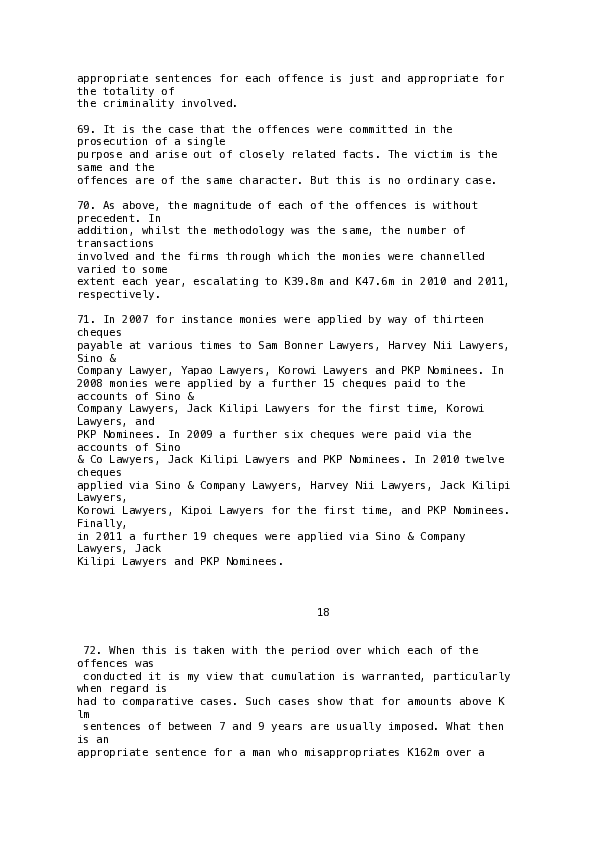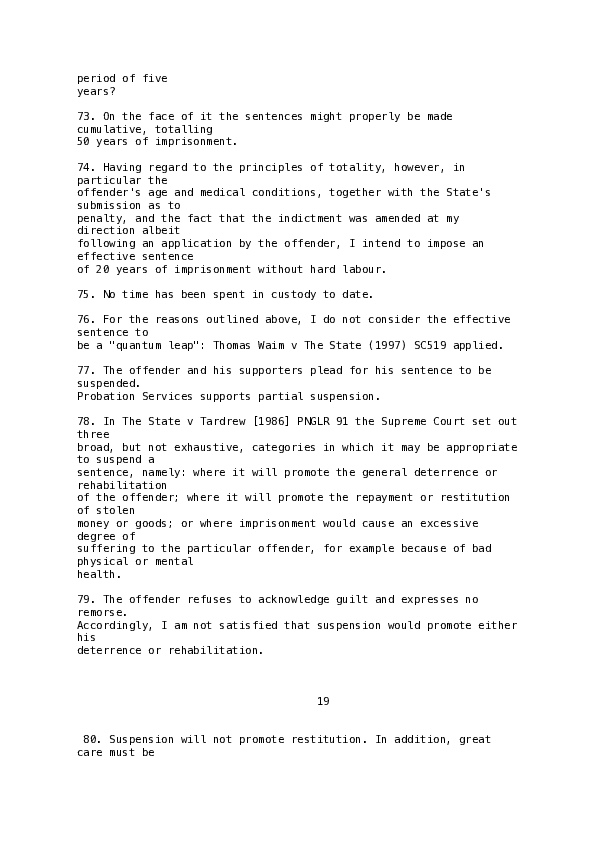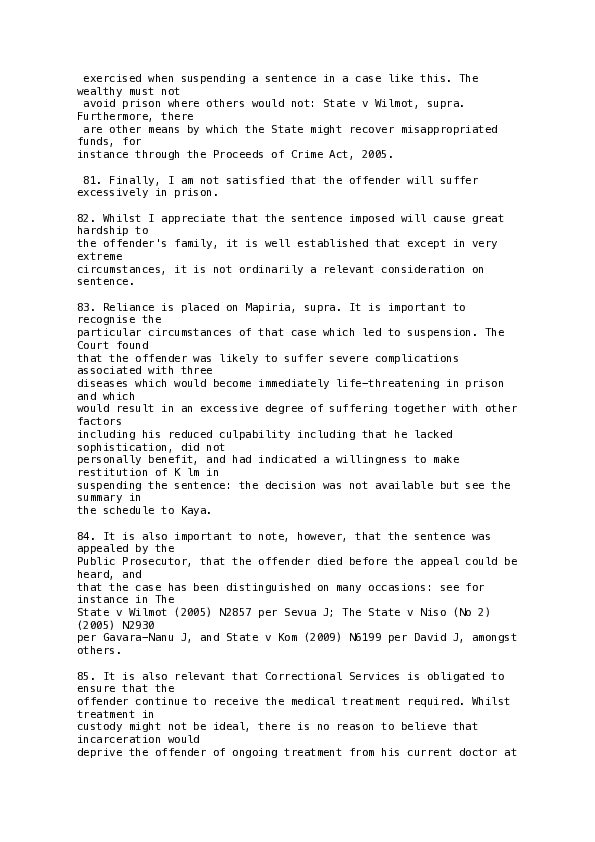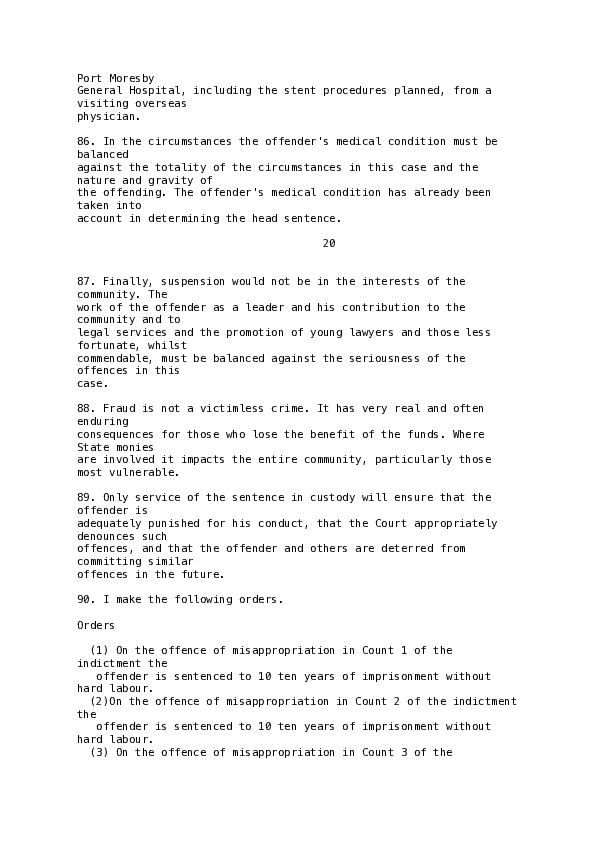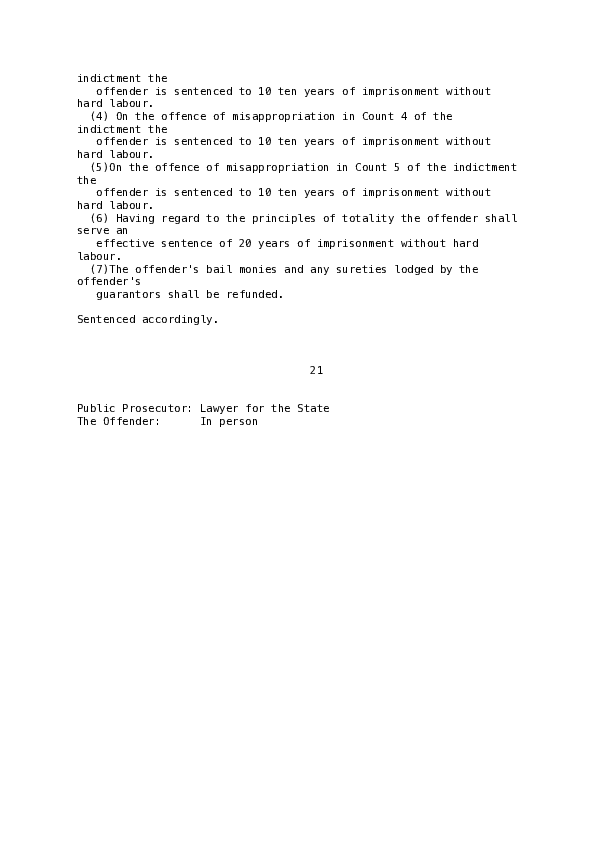The State v Paul Paraka [2023] – Decision on Sentence
Mentions of people and company names in this document
It is not suggested or implied that simply because a person, company or other entity is mentioned in the documents in the database that they have broken the law or otherwise acted improperly. Read our full disclaimer
Document content
-
PAPUA NEW GUINEA
[IN THE NATIONAL COURT OF JUSTICE]CR (FC) No. 118 OF 2019
THE STATE
V
PAUL PARAKA
Waigani: Berrigan J
22 September and 4 October 2023
CRIMINAL LAW— SENTENCE — S 383A(1)(a)(2)(d) of the Criminal Code —
Five counts of the misappropriation of State monies between 2007 and
2011 in
the sums of K30,300,000, K30,054,312.68, K14,480,672.28, K39,808,610
and
K47,608,300, respectively, by senior lawyer — Most serious instances
of the
offence — Maximum penalty of 10 years of imprisonment imposed in
each case
— To be served cumulatively in part — No suspension warranted —
Effective
sentence of 20 years of imprisonment without hard labour imposed.Cases Cited:
Wellington Belawa v The State 11988-1989] PNGLR 496
The State v Niso (No 2) (2005) N2930
The State v Tiensten (2014) N5563
The State v Daniel Mapiria
The State v Kendi (No. 2) (2007) N3131
State v Moko Essi Kam (2009) N6199
The State v Haru (2014) N5660
The State v Tiensten (2014) N5563
The State v Peni (No. 2) (2014) N5932
The State v Tokunia (2015) N6039
The State v Janet Oba (2016), unreported
The State v Solomon Junt Warur (2018) N7545
The State v Lohia (2019) N8042
The State v Ralewa (No. 2) (2022) N9803
State v Eremas Wartoto, unreported, 2017
Kaya & Kamen v The State (2020) SC 20261
Lawrence Simbe v The State [1994] PNGLR 38
State v Simanjon (2020) N8637
State v Naime (2005) N2873
State v Konny (2012) N4691
Regina v Peter Ivoro , 2LPNGLR 374 -
Page 2 of 28
-
Ume v The State (2006) SC836
The State v James Paru (No 3) (2021) N9248
The State v Benedict Simanjon (2020) N863 7
State v Tony Kande, Henry Naio and Wilson Muka (2021) N9252
The State v James Paru (No 3) (2021) N9248
The State v Paul Paraka (Decision on Admission of Bank Records)
(2022) N9568
Paul Paraka v Kaluwin (2019) N7975
The State v Paul Paraka (Decision on Presentation of Indictment)
(2020) N8229
The State v Paul Paraka (Decision on Verdict) N10273
Goli Golu v The State [1979] PNGLR 653
Mase v The State 119911 PNGLR 88
Tremellan v The Queen f 19731 PNGLR 116
Public Prosecutor v Kerua [1985] PNGLR 85
The State v Paul Paraka (2021) N8807
The State v Paul Paraka (2021) N893 8
Thomas Waim v The State (1997) SC519
The State v Tardrew [1986] PNGLR 91.
State v Wilmot (2005) N2857
State v Niso (No 2) (2005) N2930
State v Kom (2009) N6199Legislation and other materials cited:
Sections 11, 19, 383A(1)(a)(2)(d) of the Criminal CodeCounsel
Ms H. Roalakona for the State
Mr P. Paraka for himselfDECISION ON SENTENCE
4 October 2023
1. BERRIGAN J: The offender, Paul Paraka, was convicted following
trial of five counts of misappropriating property belonging to the
State between
2007 and 2011 in the amounts of K30,300,000, K30,054,312.68,
K14,480,672.28,,K39,808,610 and K47,608,300, respectively, contrary
to s.
383A(1)(a)(2)( (d) of the Criminal Code: The State v Paul Paraka
(Decision on
verdict) (2023) N10273.
22. The offender was the principal of the law firm, Paul Paraka
Lawyers (PPL).
In October 2006 he obtained orders in National Court proceedings, OS
829 of
2006, staying the directive of the Chief Secretary to stop all
payments to PPL,
and ordering the State to pay K6.5m to PPL. Those orders were stayed
by the -
Page 3 of 28
-
Supreme Court on 22 November 2006 pending appeal by the State. On 29
December 2006 the offender obtained orders in National Court
proceedings, OS
876 of 2006, staying the decisions of the Minister for Justice and
the Attorney-
General to terminate the briefing out of State matters to PPL, and
to cease all
payments to PPL, and the decisions of the National Executive Council
and the
Attorney-General to establish a departmental investigation into all
brief-outs to
private lawyers, including PPL, pending judicial review. On 2 March
2007 in the
same proceedings the offender obtained an order for the payment of
K6.44m to
PPL. Those orders and the entire proceedings in OS 876 of 2006 were
stayed by
the Supreme Court on 12 March 2007 pending appeal by the State. The
appeals
remained on foot until July 2014.3. In the meantime, commencing on 24 April 2007, every year for five
years
between 2007 and 2011 the offender procured a person or persons
within the
Department of Finance to dishonestly apply monies to his own use and
the use of
others in the sum of K30,300,000, K30,054,312.68, K14,480,672.28,
K39,808,610 and K47,608,300, respectively. The monies were applied
by way
of a total of 65 cheques drawn in favour of a property investment
company wholly
owned and operated by the offender but not bearing his name or to
the accounts
of seven other law firms at various times, none of which had any
entitlement to
the monies, in a calculated and elaborate scheme designed to
distance the monies
from the offender and avoid detection. In the case of monies paid to
the law
firms, they retained at least K30,000 to K50,000 but sometimes as
much as
K400,000 before almost immediately paying on the proceeds of the
cheques to
PPL or PKP Nominees, the offender’s law firm and wholly owned
company,
respectively.4. The monies constituted the principal form of deposits to the
accounts of
PPL and PKP Nominees during the period. Expenditure of the monies
began
soon after deposit in every case and the monies were dissipated. -
Page 4 of 28
-
5. It now remains to sentence him.
Sentencing Principles and Comparative Cases3
6. In Wellington Belawa v The State [1988-1989] PNGLR 4% the Supreme
Court identified a number of factors that should be taken into
account on sentence
for an offence of misappropriation, including:a) the amount taken;
b) the quality and degree of trust reposed in the offender;
c) the period over which the offence was perpetrated;
d) the impact of the offence on the public and public confidence;
e) the use to which the money was put;
f) the effect upon the victim;
g) whether any restitution has been made;
h) remorse;
i) the nature of the plea;
j) any prior record;
k) the effect on the offender; and
1) any matters of mitigation special to the accused such as ill
health, young
or old age, being placed under great strain, or perhaps a long
delay in
being brought to trial.7. The Supreme Court further suggested that the following scale
of sentences may provide a useful base, to be adjusted upwards or
downwards
according to the factors identified above, such that where the
amount
misappropriated is between:a) K1 and K1000, a gaol term should rarely be imposed;
b) K 1000 and K10,000 a gaol term of up to two years is
appropriate;
c) K 10,000 and K40,000, two to three years’ imprisonment is
appropriate;
and
d) K40,000 and K150,000, three to five years’ imprisonment is
appropriate.8. It is generally accepted that whilst the principles to be applied
when
determining sentence remain relevant and applicable, the tariffs
suggested in
Wellington Belawa are now outdated because of the seriousness and
prevalence
of offences: see The State v Niso (No 2) (2005) N2930; The State v
Tiensten (2014) N5563; and many others. -
Page 5 of 28
-
9. In 2013 Parliament recognised this by significantly increasing
the
maximum penalties applicable to 50 years of imprisonment for amounts
greater
than Kim and life imprisonment for amounts greater than KlOm. The
offences
in this case occurred prior to the 2013 amendments to penalty.
Accordingly, the
maximum penalty in each case is 10 years of imprisonment: s 11(2),
Criminal
Code applied.
4State Submissions
10. The State submitted that each of the offences is unprecedented
in size in
the history of Papua New Guinea and warrants the maximum penalty.11. In support of its submissions the State referred to the
following cases
noting that in each case involving the misappropriation of more than
Klm a
sentence of seven years imprisonment or more was imposed. For
completeness,
I have noted where sentence was suspended in whole or in part:a) The State v Daniel Mapiria, unreported judgement, 7 September
2004,
CR 1118/2000, Mogish J — the offender was the Chairman of the
National Gaming Board and dishonestly signed 41 cheques payable
as
cash for the total sum of K3.188 million over a period of about
10
months. He was found guilty after trial and sentenced to 9
years’ wholly
suspended on conditions including the repayment of K lm;
b) The State v Kendi (No. 2) (2007) N3131, Lenalia J — the
prisoner
dishonestly obtained K4,298,037.33 from the State, with
assistance of
corrupt officers, from the Department of Finance & Treasury and
the
Department of Defence, in payment of a claim that the Defence
Force
present on Bougainville during the crisis had unlawfully used
machinery and equipment belonging to his company between 1993
and
1997. Evidence proved that the prisoner’s company never owned
any
machinery or equipment during the claim period. He was sentenced
to
13 years of imprisonment, being 9 years’ imprisonment for -
Page 6 of 28
-
misappropriation and 4 years for false pretence, to be served
cumulatively;
c) The State v Moko Essi Kom (2009) N6199, David J — the offender
pleaded guilty to misappropriating K3.78 million belonging to
the State,
over a period of 14 months, in concert with public officials and
a banker
by making a false claims to the Department of Finance and
Treasury.
The claims were paid by way of bank cheque which were paid to
the
credit of a bank account to which he had access in a false name.
He
was sentenced to 8 years’ imprisonment;
d) The State v Haru (2014) N5660, Salika DCJ — the offender
dishonestly
sold land known as the Kone Tigers Oval for the sum of K2.6
million
and applied the monies to his own use. He was convicted
following
trial sentenced to 8 years’ imprisonment, 4 of which was to be
suspended upon restitution;
e) The State v Tiensten (2014) N5563, Salika DCJ — the offender,
a
Member of Parliament and the Minister of National Planning and5
Monitoring, was found guilty following trial of one count of
dishonestly
applying to the use of another, namely Travel Air, K10 million
belonging to the State. He was sentenced to 9 years’ imprisonment,
4
years of which was suspended upon restitution of K 1 Om to be made
within 4 years;
f) The State v Peni (No. 2) (2014) N5932, Kawi AJ – the offender was
found guilty following trial of dishonestly applying K2.4 million
in
public funds obtained for the purpose of a water project to his own
use.
He was sentenced to 8 years’ imprisonment wholly suspended on
condition of restitution within 5 years;
g) The State v Tokunia (2015) N6039, Salika DCJ — the offender was
found guilty following trial of dishonestly applying K1.5 million
obtained from the Department of National Planning and Monitoring
for
the rehabilitation of a plantation to his own use. He sentenced to
7
years’ imprisonment;
h) The State v Janet Oba (2016), unreported, Salika DCJ — The
prisoner,
an Inspector of Police, uttered a forged court order directing BSP
to -
Page 7 of 28
-
release the sum of K1.2 m to her company which she then
misappropriated. She was sentenced to 5 years’ imprisonment
following trial;
i) The State v Solomon Junt Warur (2018) N7545, Berrigan J — the
prisoner cooperated with authorities from a very early stage and
pleaded
guilty at the earliest opportunity to one count of misappropriating
K811,969.53 belonging to the State. Over a period of more than 3
and
half years the prisoner, a Communications Officer in the
Information
and Communication Technology (ICT) Section of Correctional
Services (CS), issued 66 false orders and invoices on behalf of CS,
payable to his own company, Mere-Tech, for which no goods and
services were supplied. He was sentenced to 7 years’ imprisonment;
j) The State v Lohia (2019) N8042, Berrigan J — the prisoner was
employed by the ANZ Bank as an Asset Finance Officer. Over a period
of 22 months between 27 May 2013 and 30 March 2015 the offender
used his unique bank teller identification number on 194 occasions
to
falsely credit amounts to the bank’s system, recording them either
as
refunds, reimbursements or lease payments in its “DFR Account —
Asset Finance”, or as “unposted items in suspense”. On a few
occasions
the credits were posted to customer accounts held with the bank.
The
offender then transferred equivalent amounts to his own personal
bank
account or that of his associates, from which he accessed the
monies,
either directly, together with his associates, or via his
associates’ bank
cards. In total the offender misappropriated K1,008,314.17, the
bulk of
which occurred prior to the amendments. He cooperated with6
authorities from a very early stage and pleaded guilty at the
first
opportunity. He was sentenced to 8 years’ imprisonment; and
k) The State v Ralewa (No. 2) (2022) N9803, Wawun-Kuvi AJ — the
prisoner whilst an employee of Asian Pacific Brokers Limited,
dishonestly applied the sum of K931, 800 to his own use through
the
means of the BSP Internet Banking Facility. The monies were
from
clients which were deposited into the trust account of the
company from
which he transferred out from the trust account and into his
personal
company account. He was sentenced to 7 years’ imprisonment. -
Page 8 of 28
-
12. I also note the case of State v Eremas Wartoto, unreported,
2017, Manuhu
J, in which the offender was the sole shareholder and director of a
company
awarded a government contract for almost lam to renovate a high
school. He
was convicted of misappropriating monies paid up front under the
contract,
K6,791,408.20, within five months and sentenced to 10 years of
imprisonment.13. The State also refers to Maya & Kamen v The State (2020) SC
2026, Batari,
Mogish and Berrigan JJ in which the appellants, a landowner
representative and
his lawyer were convicted following trial of misappropriating K5
million
belonging to the people of East Awin in Western Province. Their
appeal against
the sentence was dismissed and the sentence of 15 years of
imprisonment in each
case, 5 years of which is to be suspended upon restitution of K2.5
million, was
affirmed. It must be noted, however, that the offending in that case
occurred after
the 2013 amendments.14. The State submits in further aggravation that the fraud was
perpetrated over
a period of five years. It was not spur of the moment but a highly
complex scheme
demonstrating careful planning as seen from the number of years over
which the
offence was committed, involving the use of other law firms to
receive the
payments, under the pretext of court orders in OS 876 of 2006, in
which the
offender was a party, and the transfer of monies to the accused’s
law firm and
company accounts. The offender did not hold a position of trust but
was a senior
practising lawyer and his conduct was unbecoming of a person who had
taken an
oath to uphold the laws of the country. The monies were public
monies intended
for the public benefit and were instead applied to the offender’s
own use including
his family members. The effect on the victim has been the loss of
K162m which
could have been used for public hospitals, schools and roads. The
offending -
Page 9 of 28
-
affected the integrity of the various government agencies involved
in the
payments. It created a negative impression against public lawyers.
The
government expended resources in the investigation of the payments
and the7
establishment of Task Force Sweep. The offender has failed to
demonstrate any
remorse.15. The State tendered an affidavit of the former Solicitor-
General, Neville
Devete and referred to material contained in the Pre-Sentence and
Means
Assessment Reports from Chief Inspector Gitua. Both call for a
severe penalty to
be imposed having regard to the public interest.16. Whilst emphasising the national interest, Mr Devete also states
that he and
his family had to resettle with his family due to intimidation and
threats issued to
his family as a result of the investigation into the offender’s
conduct. I have seen
documentation during the trial which confirms that Mr Devete is
currently living
in Australia with his family under a protection visa. I am also
unaware that Mr
Devete is currently unable to return to the country. Whilst I accept
that his
situation has affected his career and impacted his financial and
emotional well-
being, as stated in his affidavit, the threats were issued by
unidentified persons,
responsibility for the threats is not a matter before this Court and
those matters
are not relevant to the determination of sentence.17. The State further submits that whilst the offender’s reputation
as a lawyer
and the operation of his law firm has been tainted this is the
unfortunate
consequence of his own action. Whilst he may argue that his law firm
has done
much good, it does not mitigate the fact that K1 62m of public funds
was
squandered by very deceitful means. There has been no restitution to
date.18. In mitigation the offender is a first-time offender. He is an
-
Page 10 of 28
-
educated and
highly sophisticated senior lawyer. He has a medical condition.19. The State submits that in view of the aggravating factors, the
prevalence of
the offence and the need for both specific and general deterrence,
the only
appropriate sentence is the maximum head sentence of 10 years of
imprisonment
in each case.20. Having regard to the totality principle, however, it submits
that the
sentences should be served concurrently, such that it seeks an
effective sentence
of 10 years of imprisonment.Defence Submissions
8
21. The offender maintains as he has through various motions, on
allocutus
and again on submissions that the verdict is wrong and that sentence
cannot be
passed.22. Alternatively, he submits that I reserve my decision on sentence
and allow
the Supreme Court appeal to be heard and determined first, following
which I
may pass sentence in the event his appeal is dismissed.23. In the further alternative, he relies on Mapiria, supra to have
the sentence
wholly suspended. He is the victim in this case. He has suffered
heart problems
and could have lost his life as a result of this case. He went
through a medical
procedure to have stents inserted last year and now requires further
stents. His
doctor says that he is at risk of heart attack at any time.24. Or finally, in the event that I impose a custodial sentence he
asks that I
allow him one month to surrender himself to police during which he
will make
an application to the Supreme Court for bail so that he can run his
appeal.Consideration
-
Page 11 of 28
-
25. I reject the offender’s submissions that sentence should not be
passed. He
is entitled to maintain that the verdict is wrong but for the
reasons previously
given the appropriate place for those contentions is before the
Supreme Court.26. I do not intend to postpone sentence nor reserve it pending the
appeal
against conviction. It is in the interest of justice and the
effective administration
of it that the matter is concluded before the National Court. The
offender is at
liberty to make an application for bail before an appropriate
authority in
accordance with the law.27. S. 19 of the Criminal Code provides the Court with broad
discretion on
sentence. Whilst guidelines and comparative cases are relevant
considerations,
every sentence must be determined according to its own
circumstances: Lawrence
Simbe v The State [1994] PNGLR 38. Applying the principles outlined
in Wellington Belawa, the following matters have been taken into
account in
determining an appropriate sentence.28. I note the State’s reference to Kaya’s case. That case concerned
the
penalties following amendment which are significantly greater than
those9
applicable in this case. I make it very clear that I am sentencing
according to the
maximum penalty of 10 years of imprisonment in this case.29. In general terms the greater the monies involved the more
serious the
offending. The quantum of each one of the offences is without
precedent and on
any objective view constitutes offending of the worst kind
warranting the
maximum penalty on this basis alone.30. This applies also to Count 1 even allowing for the possibility
that some
monies were owed to the offender’s law firm for the years prior to
2007. The
evidence excluded any rational possibility that the offender acted
in an honest -
Page 12 of 28
-
claim of right without intention to defraud with respect to any of
the monies, and
further excluded any rational possibility that even as much as K13m
was owed to
the accused by the State for legal fees outstanding prior to 2007,
or that the
accused believed that such monies were owing to him: The State v
State v Paul
Paraka (Decision on Verdict) N10273 at [390] to [392].31. The aggravating features in this case, however, are multiple and
glaring.32. This was not a case involving a breach of trust. The offender
was not
employed in the public service nor did he hold public office.
Nevertheless, the
fact that he was a lawyer, and a very senior lawyer at that, is a
highly significant
and greatly aggravating feature of the offending.33. The monies were State monies intended for the payment of
judgment debts
against the State. The offender was aware of that and grossly abused
his
knowledge and experience not only as a lawyer but a lawyer who acted
for the
State to commit the offences. Furthermore, as a lawyer it was his
duty to uphold
and serve the law in accordance with his oath and his obligations
under the
Lawyers Act and the Professional Conduct Rules. He abused that duty.
Moreover, as a result of his education and experience, he would have
appreciated
better than most the gravity of his offending.34. The Courts have repeatedly held that dishonesty offences by
serving police
officers must receive more severe punishments: see the authorities
discussed in
State v Simanjon (2020) N8637 at [56] to [58], including State v
Naime (2005)
N2873 and State v Konny (2012) N4691, amongst others.10
35. It is my view that the Court must also strongly condemn
dishonesty
offences by lawyers. They bring the law and those who serve it into
disrepute and
undermine the very confidence in our system of justice that is so
essential to -
Page 13 of 28
-
maintaining the rule of law. In general terms, the more senior the
lawyer, the
more severe the punishment must be. By his own account, the offender
was one
of the most senior lawyers in the country at the time of the
offences.36. In addition, this was an elaborate scheme conducted via multiple
transactions and the use of the offender’s own property investment
company and
multiple law firms through which the payments were funnelled for
each year of
the five consecutive years that the offending took place,
demonstrating careful
planning and a calculated design to avoid detection and distance the
offender
from the monies. It is also relevant that some payments were made on
the pretext
of the court order obtained by the offender in the National Court in
OS 876 of
2006 even as late as 2010 even though the Supreme Court had stayed
those orders
in March 2007, as the offender well knew.37. Furthermore, the monies were applied for the offender’s own use
and
benefit. He was the architect of the scheme and its ultimate
beneficiary. Whilst
a comparatively small portion of the monies were retained in the
accounts of the
law firms through which they were channelled, the vast bulk of the
monies were
delivered to the bank account of the offender’s law firm and wholly
owned
company. It is a measure of the magnitude of the offending in this
case that the
amounts retained in the law firms accounts represent in total
several millions of
Kina but the bank records show not only that the bulk of the
proceeds were
transferred to bank accounts controlled by the offender but that
overwhelmingly
the monies constituted the principal form of deposits to the
accounts of PPL and
PKP Nominees in both size and number. It does appear that some
payments were
made to members of the offender’s family. In any event, expenditure
of the
monies began soon after deposit in every case and the funds were
dissipated.38. None of the monies have been recovered and none will be
restituted. I
make it clear that whilst restitution would normally constitute a -
Page 14 of 28
-
factor in
mitigation the contrary is not a factor in aggravation.39. As above, the value of the monies in this case are on any
objective view
exceptional. But much more was at stake here than money. There can
be no doubt
that the impact on the victim has been enormous, albeit difficult to
measure. The
monies belonged to the Independent State of Papua New Guinea and
therefore its
people. In the immediate sense the monies were intended to meet the
cost of
11judgement debts against the State but the loss of every Kina
represents the loss of
scarce public resources that could not be delivered in goods and
services to the
people of Papua New Guinea. They are the real victims albeit that
they are not
here to share their stories.40. How does one measure, beyond the Kina figure, the true cost to
the
individual and the country of the classroom that was never built,
the school books
that were never read, the teacher that never taught, or what of the
aid post or the
hospital that lacked equipment or medicine or staff for its
patients, or the cost of
the impassable or dangerous road for the ordinary traveller, not to
mention the
community patrols never conducted or the crimes never investigated
by police
who lacked manpower, fuel or vehicles. The loss of State monies is
not some
abstract concept. It has real and enduring social and economic
impacts even if it
is difficult to quantify them.41. The offence not only impacted the public but also public
confidence. I
accept the statement of the former Solicitor-General that the
offences reflected
poorly on his Office and the State lawyers it employed. Moreover,
the offences
were conducted in concert with a person or persons inside the
Department of
Finance, the peak department responsible for administering
government monies.
At a time when government resources are limited and the prevalence
of -
Page 15 of 28
-
corruption is of increasing concern to the community, the exposure
of such a gross
abuse of such large amounts of State monies over such an extended
period of time
must have had a serious effect on public confidence in the system of
government
administration as a whole.42. It must also be recognised that offences of such scale against
public funds
have the potential to tarnish Papua New Guinea’s standing at the
international
level and deter foreign investors with potentially far-reaching
consequences for
the development of the country.43. It is also a regrettable fact that offences of this type are
prevalent. Whilst
an exceptional case, it does demonstrate that the methods used to
conduct such
crimes are becoming increasingly sophisticated and the losses
increasingly large.44. There are no extenuating circumstances associated with the
commission of
the offences themselves which would diminish the culpability of the
offender:
see Regina v Peter Ivor° [1971-721 PNGLR 374; Ume v The State (2006)
SC836.12
45. There are few matters in mitigation. It is the offender’s first
offence. The
offender is also of prior good character.46. The offender is 54 years of age. He is from Kumu Village in Mul
Baiyer
District, Western Highlands Province, He is the eldest of five
children. His
parents died some time ago. He has three wives and 14 children, all
of whom it is
reported in the pre-sentence report are adults and live with him at
his home in
Port Moresby, together with a grandchild.47. The offender is well educated. He completed high school in Mt
Hagen and
Port Moresby. He obtained a Bachelor of Laws with Honours from the
University
of Papua New Guinea, a Masters of Laws from the University of
California and -
Page 16 of 28
-
commenced a PhD with Oxford University in 1992 from which he later
withdrew.48. The offender was a tutor at the University of Papua New Guinea
before
establishing his own law firm which operated for more than twenty
years until
his arrest in 2013.49. The offender was the principal of PPL. According to the pre-
sentence
report the firm was one of the largest in the country, employing
more than 1500
lawyers and administrative staff, operating nationwide, at a cost of
more than half
a million Kina every month. The offender mentored and financially
supported
many lawyers so that they could start their own law firms, including
lawyers like
Adam Ninkama, Paul Otis, Martin Kombri, Nicholas Tame and others,
who now
employ Papua New Guineans and pay taxes to the government. He also
sponsored several administrative staff and others to study law. He
initiated and
funded community projects in the law and justice sector.50. The offender is also a leader of his tribe, his Local Level
Government, and
the Mul-Baiyer electorate. He leads conflict negotiations and
mediations and has
used his own money to bring peace and support the payment of
compensation.
He brokered peace in one of the biggest land mediations following
fierce tribal
warfare that destroyed many lives and properties in the Lumusa sub-
district.51. The impact of the offence on the offender has been and will
continue to be
grave. He was the principal of PPL, one of the biggest in the
country, operating
nationwide, together with other companies like PKP Nominees.
According to, the
pre-sentence report all of this has been lost. The offender
continues to operate as
a one-man firm but no longer employs other lawyers. At thee
beginning .of this
13year and last he attempted to revive the law firm by offering
assistance to
remandees at Bomana but due to the logistical and other costs
involved he has -
Page 17 of 28
-
temporarily stalled his plans. He intends to take it up again if he
is given a non-
custodial sentence. He has lost all real and financial assets other
than each of his
properties in Port Moresby and in the village. It is also the
unfortunate
consequence of his offending that those of his children who were
studying
overseas have had to return to the country. He relies on his
children for financial
support.52. Samuel Ketan, the principal of Ketan Lawyers, is from a
neighbouring
village and says that he used to hear of how the offender used his
own money to
make peace within and between tribes, including giving K100,000 and
30 pigs to
bring peace to two warring tribes. He has witnessed him give
assistance to
struggling village people, grade 12 students, and free legal aid to
those less
fortunate, as well as sponsor at least one student to study law. The
offender is
human and has made a mistake. “Let’s all move on” and let this be a
stepping-
stone for the future. If the Court wants to get a real glimpse of
the offender’s
philanthropic activities allow Probation Services to travel the
length and breadth
of the country to speak to all the people the offender has touched
in one way or
another. Sending him to prison will not help. He asks the Court to
place him on
suspended sentence and use his skills for restitution.53. A former public servant, who wished to remain anonymous, said
that when
he was the head of an agency some decades ago the offender through
his law firm
did a lot of good work for the State by defending it for a reduced
price. He asked
the Court to have mercy on the offender.54. Another former public servant, who also wished to remain
anonymous,
said that during his tenure as the head of an organisation he
engaged the
offender’s law firm to defend the State, saving it a lot of money as
the State had
only inexperienced lawyers. As a human we all make mistakes and the
offender
did his now and hopefully will not do so in the future. He asked the
Court to have -
Page 18 of 28
-
mercy on him.
55. The offender is supported by his wife and family. His wife of 32
years says
that he is a loving and kind husband who is the foundation of the
family, upon
whom everyone depends, with some children still attending primary,
secondary
and tertiary education. She reiterated that the offender has shown
leadership to
his tribe, district and province, bringing peace and services to the
community. As
a lawyer he has trained many lawyers who have become employers
themselves.
14The case has had a detrimental effect on the offender’s health and
she is worried
that any further stress could trigger his heart condition.56. The offender maintains that there is no evidence in the case
against him
and that the verdict is wrong. It is not clear if he maintains his
innocence. Of
course, he is entitled to maintain his innocence and that I have
erred but the effect
of that is that he expresses no remorse and is not therefore
entitled to any
mitigation in that regard.57. There is some mitigation in the offender’s age and medical
condition. The
offender is not, however, of particularly advanced age. Furthermore,
it is to some
extent his age and certainly his experience that enabled him to
commit the
offences. I appreciate that the proceedings have been stressful but
I do not
consider that he has been placed under any strain significantly
greater than other
accused persons. Whilst the offender has had ample opportunity to
make
alternative arrangements he has until very recently insisted on
representing
himself at every stage of the criminal proceedings. Allowance has
been made in
this regard throughout the trial and at the sentencing stage, and
the fact that his
medical condition may have been exacerbated by his decision to
represent himself
has been a matter within his control.58. As for his health, according to the latest report from the
-
Page 19 of 28
-
offender’s his
doctor, from Dr Wesong Boko, Intervention Cardiologist, Deputy Chief
Physician, Port Moresby General Hospital, dated 7 September 2023 the
offender
suffers from Coronary Artery Disease. The report confirms that the
offender was
treated last year with the insertion of a stent or stents. An
angiogram conducted
on 7 September 2023 revealed that the offender has developed a
severe 95%
blockage in the existing stent and a similar severe 80 – 90%
blockage of the left
circumference artery. There is also a borderline lesion in the
proximal descending
artery, at 40-50%, and some evidence of minor lesion, 20-30%, of the
right
coronary artery. The offender suffers from double vessel disease. In
the
circumstances the offender is a high risk patient who is at risk of
severe heart
attack and is advised to immediately cease all stress, change his
life style to more
traditional living in the village and undergo percutaneous coronary
intervention
with the insertion of a further three stents. It is intended to
conduct the procedure
in several weeks time following which it appears he is expected to
resume duties.
I also take note that the report states that the offender has kidney
disease albeit
no further details are provided.59. Whilst I appreciate that his condition has been exacerbated by
the stress
associated with this case, fundamentally the cardiovascular disease
the offender
15suffers from is one associated in part with lifestyle and
behaviours associated with
diet and exercise. It is the type of condition that professionals,
lawyers, business
people and others who live primarily sedentary lifestyles sometimes
suffer from.
It is the type of disease sometimes suffered by those who have the
education,
experience and opportunity to commit the types of offences committed
here. In
the circumstances the offender’s medical condition must be balanced
against the
totality of the circumstances in the case and the nature and gravity
of the
offending. -
Page 20 of 28
-
60. The offences occurred between 2007 and 2011 but a lapse of time
between
the commission of an offence and the imposition of sentence is not a
mitigating
factor of itself: The State v James Paru (No 3) (2021) N9248
adopting In R v
Law; Ex parte A-G [1996] 2 Qd R 63. Whether delay is a relevant
consideration
will depend on the circumstances. Where there has been a failure on
the part of
authorities or the judicial process to bring an offender to justice
within a
reasonable time that may constitute a factor in mitigation,
particularly where an
offender has cooperated with authorities from an early stage.
Consideration
should also be given to the conduct of the offender him or herself
and their role
in the delay. Delay may also be relevant where the offender has made
demonstrable progress towards his or her rehabilitation during the
period of
delay. As in any case delay must be balanced against all the other
factors for
consideration, including the nature and seriousness of the offence:
The State v
Benedict Simanjon (2020) N8637 at [40]; State v Tony Kande, Henry
Naio and
Wilson Muka (2021) N9252 at [58]; The State v James Paru (No 3)
(2021) N9248.61. There has been no unreasonable delay in this case. The offender
brought
various challenges at each stage of the proceedings from the time
search warrants
were first obtained, at the committal stage, and prior to
presentation of the
indictment: see The State v Paul Paraka (Decision on Admission of
Bank
Records) (2022) N9568 at [29]; Paul Paraka v Kaluwin (2019) N7975;
The State
v Paul Paraka (Decision on Presentation of Indictment) (2020) N8229;
and The
State v Paul Paraka (Decision on Verdict) N10273 at [6] and the
various
decisions referred to therein. The proceedings before the National
Court were
vigorously challenges on multiple fronts and whilst some delay was
occasioned
by the pandemic and the offender’s health, several applications by
him for
lengthier adjournments were refused both during the trial and these
sentence
proceedings, most recently on the day of submissions. -
Page 21 of 28
-
62. In summary, in determining the sentence to be imposed on each of
the
offences contained in the indictment I have taken into account the
offender’s age,
personal circumstances and medical conditions. I have also taken
into account16
his lack of previous conviction, his prior good character, his
contribution to the
delivery of legal services for more than twenty years through one
of the largest
law firms in the country, his mentorship and support to numerous
lawyers,
together with his contribution as a leader, to the community and
through
charitable works. These are factors in his favour but they carry
limited weight
given the nature of the offending and are far outweighed by the
aggravating
factors in this case, in particular the quantum of the monies
involved, the role
played by the offender in procuring the offences, the elaborate
nature of the
scheme, the application of funds to his own use and the extent to
which he
benefitted from the crimes, his knowledge and experience as a
lawyer, and the
impact on the public and public confidence. Such offences are
prevalent and the
offending in this case calls for specific and general deterrence.63. In short, this was a case of enormous magnitude, despicable
greed and
incalculable loss to the people of Papua New Guinea. Each of the
offences clearly
constitutes misappropriation of the worst kind and I have no
hesitation imposing
the maximum penalty for each of the offences established in Counts 1
to 5 of the
indictment: Goli Golu v The State [1979] PNGLR 653 applied.64. The question remains whether and to what extent the sentences
should be
served cumulatively or concurrently.65. I remind myself of the approach to be taken when deciding
whether
sentences should be made concurrent or cumulative and the principle
of totality, Mase v The State [1991] PNGLR 88 at 92:
“It is clearly laid down by this Court in the cases referred to -
Page 22 of 28
-
that there are three
stages to go through in coming to a total sentence. The first step
is to consider
the appropriate sentence for each offence charged and then
consideration be
given as to whether they should be concurrent sentences or
cumulative sentences.
Where the decision is made to make two or more sentences cumulative,
the
sentencer is then required to look at the total sentence and see if
it is just and
appropriate. If it is not, he must vary one or more of the sentences
to get a just
total. This principle must be observed because a straightforward
addition of
sentences usually leads to a total sentence that is excessive in the
whole of the
circumstances.”
66. There is no “all-embracing” rule as to when sentences for two or
more
convictions should be made concurrent: Tremellan v The Queen f 1973]
PNGLR
116. Generally, sentences should be made concurrent where a
congeries of
offences is committed in the prosecution of a single purpose or the
offences arise
out of the same or closely related facts: Tremellan v The Queen
[1973] PNGLR
17116. Where the offences are different in character, or in relation
to different
victims, the sentences should normally be cumulative: Public
Prosecutor v
Kerua j 1985] PNGLR 85.67. The State initially proceeded with an indictment containing a
single count
of misappropriation for K162m. The indictment was amended, however,
following one of the offender’s applications: The State v Paul
Paraka (2021)
N8807 at [255] to [274] and The State v Paul Paraka (2021) N8938 at
[20] to
[22] and [34] to [43]. Applications have consequences and the fact
is that the
offender has been convicted of five counts of misappropriation each
of which are
extremely serious.68. The principle of totality requires a judge who is sentencing an
offender for
a number of offences to ensure that the total or aggregate sentence
of the -
Page 23 of 28
-
appropriate sentences for each offence is just and appropriate for
the totality of
the criminality involved.69. It is the case that the offences were committed in the
prosecution of a single
purpose and arise out of closely related facts. The victim is the
same and the
offences are of the same character. But this is no ordinary case.70. As above, the magnitude of each of the offences is without
precedent. In
addition, whilst the methodology was the same, the number of
transactions
involved and the firms through which the monies were channelled
varied to some
extent each year, escalating to K39.8m and K47.6m in 2010 and 2011,
respectively.71. In 2007 for instance monies were applied by way of thirteen
cheques
payable at various times to Sam Bonner Lawyers, Harvey Nii Lawyers,
Sino &
Company Lawyer, Yapao Lawyers, Korowi Lawyers and PKP Nominees. In
2008 monies were applied by a further 15 cheques paid to the
accounts of Sino &
Company Lawyers, Jack Kilipi Lawyers for the first time, Korowi
Lawyers, and
PKP Nominees. In 2009 a further six cheques were paid via the
accounts of Sino
& Co Lawyers, Jack Kilipi Lawyers and PKP Nominees. In 2010 twelve
cheques
applied via Sino & Company Lawyers, Harvey Nii Lawyers, Jack Kilipi
Lawyers,
Korowi Lawyers, Kipoi Lawyers for the first time, and PKP Nominees.
Finally,
in 2011 a further 19 cheques were applied via Sino & Company
Lawyers, Jack
Kilipi Lawyers and PKP Nominees.18
72. When this is taken with the period over which each of the
offences was
conducted it is my view that cumulation is warranted, particularly
when regard is
had to comparative cases. Such cases show that for amounts above K
lm
sentences of between 7 and 9 years are usually imposed. What then
is an
appropriate sentence for a man who misappropriates K162m over a -
Page 24 of 28
-
period of five
years?73. On the face of it the sentences might properly be made
cumulative, totalling
50 years of imprisonment.74. Having regard to the principles of totality, however, in
particular the
offender’s age and medical conditions, together with the State’s
submission as to
penalty, and the fact that the indictment was amended at my
direction albeit
following an application by the offender, I intend to impose an
effective sentence
of 20 years of imprisonment without hard labour.75. No time has been spent in custody to date.
76. For the reasons outlined above, I do not consider the effective
sentence to
be a “quantum leap”: Thomas Waim v The State (1997) SC519 applied.77. The offender and his supporters plead for his sentence to be
suspended.
Probation Services supports partial suspension.78. In The State v Tardrew [1986] PNGLR 91 the Supreme Court set out
three
broad, but not exhaustive, categories in which it may be appropriate
to suspend a
sentence, namely: where it will promote the general deterrence or
rehabilitation
of the offender; where it will promote the repayment or restitution
of stolen
money or goods; or where imprisonment would cause an excessive
degree of
suffering to the particular offender, for example because of bad
physical or mental
health.79. The offender refuses to acknowledge guilt and expresses no
remorse.
Accordingly, I am not satisfied that suspension would promote either
his
deterrence or rehabilitation.19
80. Suspension will not promote restitution. In addition, great
care must be -
Page 25 of 28
-
exercised when suspending a sentence in a case like this. The
wealthy must not
avoid prison where others would not: State v Wilmot, supra.
Furthermore, there
are other means by which the State might recover misappropriated
funds, for
instance through the Proceeds of Crime Act, 2005.81. Finally, I am not satisfied that the offender will suffer
excessively in prison.82. Whilst I appreciate that the sentence imposed will cause great
hardship to
the offender’s family, it is well established that except in very
extreme
circumstances, it is not ordinarily a relevant consideration on
sentence.83. Reliance is placed on Mapiria, supra. It is important to
recognise the
particular circumstances of that case which led to suspension. The
Court found
that the offender was likely to suffer severe complications
associated with three
diseases which would become immediately life-threatening in prison
and which
would result in an excessive degree of suffering together with other
factors
including his reduced culpability including that he lacked
sophistication, did not
personally benefit, and had indicated a willingness to make
restitution of K lm in
suspending the sentence: the decision was not available but see the
summary in
the schedule to Kaya.84. It is also important to note, however, that the sentence was
appealed by the
Public Prosecutor, that the offender died before the appeal could be
heard, and
that the case has been distinguished on many occasions: see for
instance in The
State v Wilmot (2005) N2857 per Sevua J; The State v Niso (No 2)
(2005) N2930
per Gavara-Nanu J, and State v Kom (2009) N6199 per David J, amongst
others.85. It is also relevant that Correctional Services is obligated to
ensure that the
offender continue to receive the medical treatment required. Whilst
treatment in
custody might not be ideal, there is no reason to believe that
incarceration would
deprive the offender of ongoing treatment from his current doctor at -
Page 26 of 28
-
Port Moresby
General Hospital, including the stent procedures planned, from a
visiting overseas
physician.86. In the circumstances the offender’s medical condition must be
balanced
against the totality of the circumstances in this case and the
nature and gravity of
the offending. The offender’s medical condition has already been
taken into
account in determining the head sentence.20
87. Finally, suspension would not be in the interests of the
community. The
work of the offender as a leader and his contribution to the
community and to
legal services and the promotion of young lawyers and those less
fortunate, whilst
commendable, must be balanced against the seriousness of the
offences in this
case.88. Fraud is not a victimless crime. It has very real and often
enduring
consequences for those who lose the benefit of the funds. Where
State monies
are involved it impacts the entire community, particularly those
most vulnerable.89. Only service of the sentence in custody will ensure that the
offender is
adequately punished for his conduct, that the Court appropriately
denounces such
offences, and that the offender and others are deterred from
committing similar
offences in the future.90. I make the following orders.
Orders
(1) On the offence of misappropriation in Count 1 of the
indictment the
offender is sentenced to 10 ten years of imprisonment without
hard labour.
(2)On the offence of misappropriation in Count 2 of the indictment
the
offender is sentenced to 10 ten years of imprisonment without
hard labour.
(3) On the offence of misappropriation in Count 3 of the -
Page 27 of 28
-
indictment the
offender is sentenced to 10 ten years of imprisonment without
hard labour.
(4) On the offence of misappropriation in Count 4 of the
indictment the
offender is sentenced to 10 ten years of imprisonment without
hard labour.
(5)On the offence of misappropriation in Count 5 of the indictment
the
offender is sentenced to 10 ten years of imprisonment without
hard labour.
(6) Having regard to the principles of totality the offender shall
serve an
effective sentence of 20 years of imprisonment without hard
labour.
(7)The offender’s bail monies and any sureties lodged by the
offender’s
guarantors shall be refunded.Sentenced accordingly.
21
Public Prosecutor: Lawyer for the State
The Offender: In person -
Page 28 of 28
-
22
